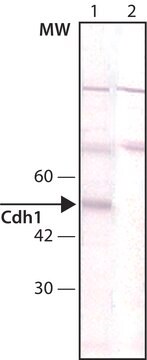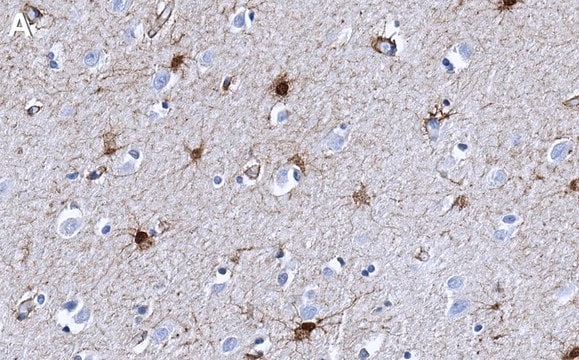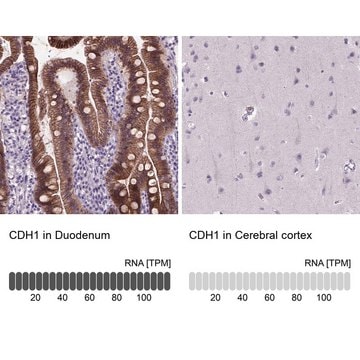WH0000999M1
Monoclonal Anti-CDH1 antibody produced in mouse
clone 3F4, purified immunoglobulin, buffered aqueous solution
Synonyme(s) :
Anti-Arc1, Anti-CDHE, Anti-ECAD, Anti-LCAM, Anti-UVO, Anti-cadherin 1, type 1, E-cadherin (epithelial)
About This Item
Produits recommandés
Source biologique
mouse
Niveau de qualité
Conjugué
unconjugated
Forme d'anticorps
purified immunoglobulin
Type de produit anticorps
primary antibodies
Clone
3F4, monoclonal
Forme
buffered aqueous solution
Espèces réactives
human
Technique(s)
immunohistochemistry (formalin-fixed, paraffin-embedded sections): suitable
indirect ELISA: suitable
proximity ligation assay: suitable
western blot: 1-5 μg/mL
Isotype
IgG1κ
Numéro d'accès GenBank
Numéro d'accès UniProt
Conditions d'expédition
dry ice
Température de stockage
−20°C
Modification post-traductionnelle de la cible
unmodified
Informations sur le gène
human ... CDH1(999)
Description générale
Immunogène
Sequence
KGQVPENEANVVITTLKVTDADAPNTPAWEAVYTILNDDGGQFVVTTNPVNNDGILKTAKGLDFEAKQQYILHVAVTNVVPFEVSLTTSTATVTVDVLDV
Application
Actions biochimiques/physiologiques
Forme physique
Informations légales
Clause de non-responsabilité
Vous ne trouvez pas le bon produit ?
Essayez notre Outil de sélection de produits.
En option
Code de la classe de stockage
10 - Combustible liquids
Point d'éclair (°F)
Not applicable
Point d'éclair (°C)
Not applicable
Équipement de protection individuelle
Eyeshields, Gloves, multi-purpose combination respirator cartridge (US)
Faites votre choix parmi les versions les plus récentes :
Certificats d'analyse (COA)
Vous ne trouvez pas la bonne version ?
Si vous avez besoin d'une version particulière, vous pouvez rechercher un certificat spécifique par le numéro de lot.
Déjà en possession de ce produit ?
Retrouvez la documentation relative aux produits que vous avez récemment achetés dans la Bibliothèque de documents.
Notre équipe de scientifiques dispose d'une expérience dans tous les secteurs de la recherche, notamment en sciences de la vie, science des matériaux, synthèse chimique, chromatographie, analyse et dans de nombreux autres domaines..
Contacter notre Service technique








